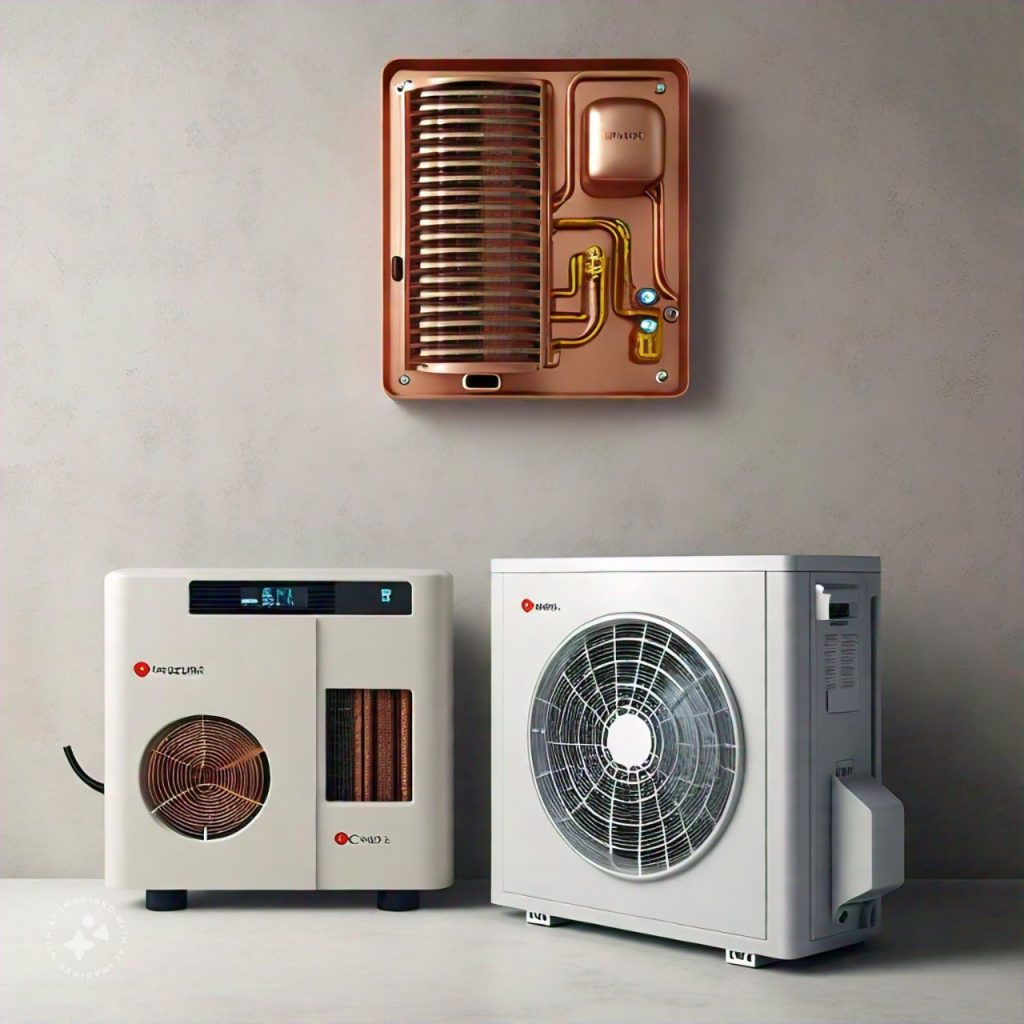When it comes to cooling and heating your home, choosing the right system can significantly impact your comfort, energy bills, and environmental footprint. Heat pumps and air conditioners are two popular options, each with its own set of advantages and disadvantages. This article will explore the differences between heat pumps and air conditioners, examining their functionality, efficiency, cost, environmental impact, and suitability for various climates to help you determine which system is better for your needs.
Table of Contents
ToggleUnderstanding Heat Pumps and Air Conditioners
Heat Pumps: A heat pump is a versatile system that can provide both heating and cooling. It works by transferring heat from one place to another. During the summer, a heat pump extracts heat from the indoor air and releases it outside, functioning like an air conditioner. In the winter, it reverses the process, extracting heat from the outside air (or ground) and transferring it indoors.
Air Conditioners: An air conditioner is designed solely for cooling. It removes heat from the indoor air and expels it outside, lowering the indoor temperature. Air conditioners come in various types, including central air conditioners, window units, and portable units.
Functionality and Efficiency
Cooling Efficiency:
- Heat Pumps: Heat pumps and air conditioners have similar cooling efficiency when it comes to removing heat from the indoor air. Both systems use refrigerant and a compressor to transfer heat.
- Air Conditioners: Air conditioners are optimized for cooling and often have high Seasonal Energy Efficiency Ratio (SEER) ratings, indicating efficient performance.
Heating Capability:
- Heat Pumps: One of the significant advantages of heat pumps is their ability to provide heating as well as cooling. In moderate climates, they are highly efficient at heating because they transfer existing heat rather than generating it.
- Air Conditioners: Air conditioners cannot provide heating. In homes with air conditioners, a separate heating system, such as a furnace or electric heater, is required for winter months.
Comparison:
- Heat pumps offer the benefit of a two-in-one system, providing both heating and cooling. This can be a major advantage in regions with mild winters. Air conditioners, while effective at cooling, require an additional heating system, which can lead to higher overall costs and complexity.
Cost Considerations
Initial Costs:
- Heat Pumps: Generally have higher upfront costs due to their dual functionality and more complex installation process. Geothermal heat pumps, in particular, have high initial installation costs.
- Air Conditioners: Typically have lower initial costs compared to heat pumps. The installation process is simpler, especially for window and portable units.
Operating Costs:
- Heat Pumps: Tend to have lower operating costs in mild climates due to their high efficiency in both heating and cooling modes. In colder climates, however, the efficiency of air-source heat pumps can decrease, leading to higher costs.
- Air Conditioners: Operating costs for air conditioners depend on their efficiency and the duration of use. Since they are used only for cooling, their operating costs are usually limited to the summer months.
Maintenance Costs:
- Heat Pumps: Require regular maintenance to ensure both heating and cooling components function efficiently.
- Air Conditioners: Also require maintenance, but typically only for the cooling components.
Comparison:
- While heat pumps may have higher initial costs, their ability to provide both heating and cooling can lead to lower overall operating costs, especially in regions with moderate climates. Air conditioners, with lower upfront costs, can be more economical for homeowners who already have a separate heating system in place.
Environmental Impact
Heat Pumps:
- Environmentally friendly because they use electricity to transfer heat rather than burning fossil fuels. This reduces greenhouse gas emissions, especially if the electricity comes from renewable sources.
- Geothermal heat pumps have an even lower environmental impact due to their high efficiency and use of stable underground temperatures.
Air Conditioners:
- Air conditioners also use electricity, which can be environmentally friendly if sourced from renewables. However, they typically have a higher environmental impact compared to heat pumps because they do not provide heating and often require a separate, fossil fuel-based heating system.
Comparison:
- Heat pumps are generally more environmentally friendly due to their dual functionality and reliance on electricity. Air conditioners, while effective for cooling, can contribute to higher greenhouse gas emissions when paired with fossil fuel-based heating systems.
Climate Suitability
Heat Pumps:
- Best suited for moderate climates where temperatures do not drop too far below freezing. In such environments, they can efficiently provide both heating and cooling year-round.
- In very cold climates, air-source heat pumps can struggle to provide sufficient heat, making them less effective.
Air Conditioners:
- Suitable for any climate for cooling purposes. They are highly effective at lowering indoor temperatures during hot weather.
- Require a separate heating system for cold weather, which can be a disadvantage in regions with significant temperature variations.
Comparison:
- In moderate climates, heat pumps are often the better choice due to their efficiency and dual functionality. In very cold or extremely hot climates, the combined use of an air conditioner and a dedicated heating system may be more effective.
Comfort and Performance
Heat Pumps:
- Provide consistent, even heating and cooling, which can be more comfortable for some homeowners.
- Some models include advanced features like variable speed blowers, enhancing comfort by maintaining a steady temperature.
Air Conditioners:
- Deliver powerful and rapid cooling, which is beneficial during hot weather.
- The comfort level depends on the type of air conditioner. Central air conditioners provide even cooling throughout the home, while window and portable units are more localized.
Comparison:
- Both systems offer comfort and performance, but heat pumps have the advantage of providing consistent heating and cooling. Air conditioners are highly effective for cooling but require a separate system for heating.
Installation and Space Requirements
Heat Pumps:
- Installation can be complex, especially for geothermal systems, which require significant space and ground work.
- Air-source heat pumps need outdoor units, which can be a consideration in terms of space and aesthetics.
Air Conditioners:
- Typically easier to install, especially window and portable units.
- Central air conditioners require a system of ducts, similar to heat pumps, which can take up space but are usually already present in homes.
Comparison:
- Heat pumps may require more space and a more complicated installation process. Air conditioners are generally simpler to install, especially in homes that already have ductwork.
Conclusion
The decision between a heat pump and an air conditioner depends on various factors, including climate, cost, environmental impact, and personal comfort preferences.
- Heat Pumps: Are ideal for moderate climates, offering high efficiency, lower operating costs, and a smaller environmental footprint due to their dual functionality.
- Air Conditioners: Are effective for cooling in any climate but require a separate heating system, leading to potentially higher costs and environmental impact in colder regions.
By considering these factors and your specific needs, you can make an informed decision that ensures your home stays comfortable year-round while optimizing energy efficiency and cost.

